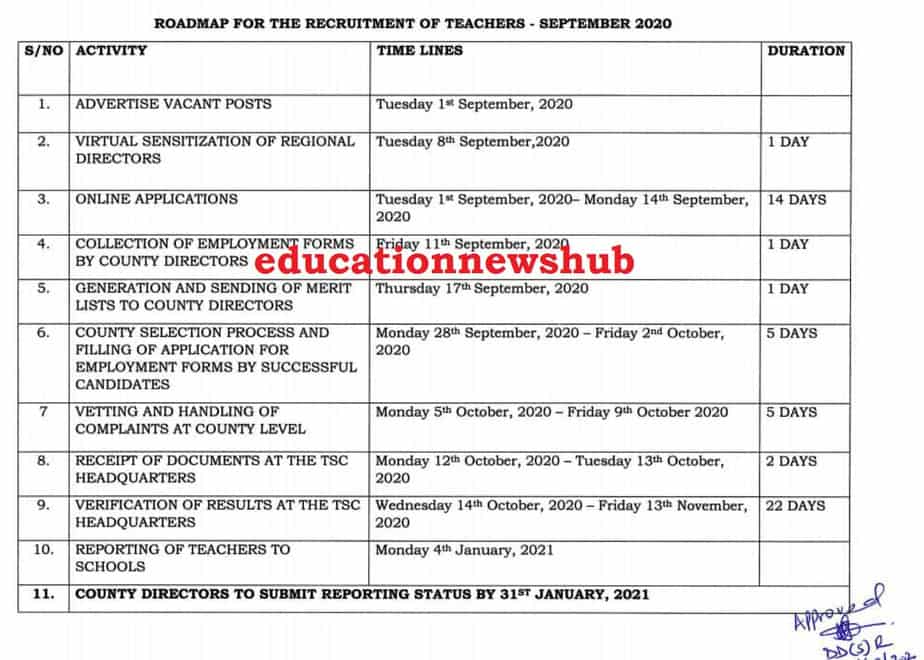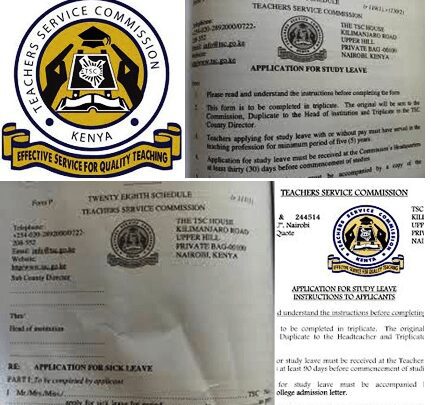TSC POLICY ON APPOINTMENT AND DEPLOYMENT OF INSTITUTIONAL ADMINISTRATORS
Read through this document to find the latest criteria used by the Teachers Service Commission (TSC) in appointing school administrators plus requirements for such appointments. Most importantly, check the tables towards the bottom of the article.
FOREWORD
Article 237 of the Kenya Constitution establishes the Teachers Service Commission as a constitutional Commission with the mandate to appoint, promote, transfer and deploy teachers to public learning institutions among others functions.
Further, the Act empowers the Commission to ensure compliance with the teaching standards; facilitate career progression and professional development of teachers; and to monitor the conduct and performance in the teaching service.
Accordingly, in exercising its Constitutional and statutory mandate, the Commission has developed the Policy on “Appointment and Deployment of Institutional Administrators”.
The Policy is aimed at streamlining the identification process to ensure that prerequisite skills and competencies are considered in the appointment and deployment of administrators. It is also aimed at aligning the institutional administrators to their roles and responsibilities to ensure accountability.
Further, the policy provides a standard procedure for identification, selection, appointment and deployment of institutional administrators. It also provides management structures and requirements for appointments to various positions in the different categories of public primary, post primary and tertiary institutions,.
The formulation of this Policy is partly informed by the recommendations of the Job Evaluation Report which was undertaken by the Salaries and Remuneration Commission (SRC) in consultation with the Commission in November 2016.
The Job Evaluation determined the relative worth of jobs in the teaching service and set remuneration on the basis of job content, responsibilities, minimum qualifications, level of decision making required, accountability and working conditions.
The Policy has also underpinned the constitutional principles of fair competition and merit, integrity, transparency and accountability, equity, fairness and impartiality, inclusiveness and non discrimination, gender equity and regional balance in the appointment and deployment of institutional administrators.
This Policy resonates with the Commission’s reform agenda, particularly the enhancement of learning outcomes through strengthening the management of learning institutions.
PREFACE
The performance of any learning institution depends on the quality and capacity of the
administrators to organize, manage and optimally utilize the available resources in order to enhance delivery of teaching programmes.
In the implementation of this policy, the Commission will endeavor to match every position with qualifications, experience and performance of every appointee in order to continuously improve the quality of supervision, teaching and learning outcomes.
The Policy on Appointment and Deployment of Institutional Administrators provides for clear career progression structures to ensure systematic progression, growth and professional development for all teachers. It outlines the experience, academic and professional requirements necessary for appointment and deployment of institutional administrators and further sets the process for career advancement and succession management in institutions.
A teacher at primary school level can now advance from the lowest administrative grade of Senior Teacher II (T-Scale 7) and gradually progress to the position of Senior Head Teacher (T-Scale 11).
Similarly, a teacher in a Post-Primary Institution will enter administrative position as a
Senior Master III (T-Scale 10) and progress to the level of Chief Principal (T-Scale 15).
In implementing the policy, the Commission will seek to attract and retain some of the best available institutional managers through substantive appointments and commensurate remuneration. Teachers appointed as institutional administrators will be expected to provide leadership and mentorship in their respective positions in order to respond to the dynamic pedagogy necessitated by Competency Based Curriculum.
Moreover, the policy is anchored on the Commissions statutory responsibility in Section 4 of the TSC Act 2012 to, at all times act in the best interests of the learners.
You may also like; TSC latest news on Promotions of teachers.
1.0 INTRODUCTION AND BACKGROUND
The re-establishment of the TSC under the Constitution of Kenya (2010) through Article 237 redefined and expanded the Commission’s mandate to; register trained teachers; recruit and employ registered teachers; assign teachers employed by the commission for service in any public learning institutions; promote and transfer teachers and exercise disciplinary control over the teachers.
The Commission was also mandated to; review the standards of education and training of persons entering the teaching service; review the demand and supply of teachers and advise the national government on matters relating to the teaching profession. In addition, the Teachers Service Commission Act, 2012 was enacted with additional functions, which included the responsibility to monitor the conduct and performance of teachers and ensure they comply with the teaching standards.
Equally important, the Commission is required to facilitate career progression and professional development of teachers, including the appointment of head teachers and principals.
Accordingly, the Policy on Appointment and Deployment of Institutional Administrators has been reviewed in line with the broad Constitutional principles that guide appointments to public office and the values expected of public officers. The Policy will also be in tandem with the Job Evaluation Report (2016), which focused on the worth of every job in the teaching service.
1.1 Rationale
The Policy on Appointment and Deployment of Institutional Administrators seeks to harmonize the constitutional requirements, provisions of the Code of Regulations for Teachers (CORT) and recommendations of the Job Evaluation Report (2016).
This is aimed at providing standard operating procedures for the identification, selection, substantive appointment and deployment of Institutional Administrators with a view to realizing the values and Principles embodied in the Constitution, the Act and the Code of regulations for teachers.
2.0 POLICY STATEMENT
The Commission is committed to appointment and deployment of qualified institutional
Administrators in all public primary, post primary and tertiary institutions across the country.
Efforts will be made to ensure that teachers deployed in administrative positions are appointed on merit through well-defined criteria.
3.0 AUTHORITY
The Policy derives its authority from:
i. The Constitution of Kenya
ii. TSC Act (Cap 212) Laws of Kenya
iii. The Basic Education Act (Cap 211) Laws of Kenya
iv. Code of Regulations for Teachers (Revised 2015); and
v. The TSC Code of Conduct and Ethics (2015)
4.0 OBJECTIVES OF THE POLICY
4.1 General objective
To promote efficiency in the deployment of institutional administrators to all basic public primary, post primary and tertiary institutions in the country through a competitive selection and appointment
4.2 Specific objectives
The Specific objectives of this policy are to;
i. Create an implementation framework for the appointment and deployment of institutional administrators in the teaching service
ii. Set out the academic and professional qualifications and other requirements necessary for selection and deployment of institutional administrators
iii. Provide standards to ensure that institutional administrative positions are competitively filled
iv. Facilitate succession management in institutional administration
5.0 GUIDING PRINCIPLES
Article 10 of the Constitution establishes the National Values and Principles of Governance that guide every state organ when making or implementing policy decisions.
Similarly, Article 232 of the Constitution sets out the Values and Principles of Public Service, which bind all state organs. Accordingly, the Commission has adopted the following values and principles to guide in the implementation of this Policy.
i. Fair competition and merit
ii. Integrity, transparency and accountability
iii. Equity and equality
iv. Impartiality in decision making
v. Inclusiveness and non-discrimination
vi. Affirmative action
vii. Timely accurate data and information
6.0 SCOPE
The Policy shall apply to all teachers in the employment of the Commission. It provides for identification, selection, appointment, deployment and performance of institutional administrators.
7.0 POLICY GUIDELINES
7.1 Overriding powers of the Commission
Nothing in this Policy will be construed to limit, diminish, extinguish or in any other way curtail the Constitutional and statutory powers granted to the Commission to transfer, deploy or assign an administrator to a public learning institution as it deems appropriate.
Specifically, and notwithstanding any other provision in this policy, the Commission reserves the right to transfer an administrator from one institution to another regardless of the number of years served in the station.
7.2 Performance of duty
i. In the execution of assigned duties, Institutional administrators shall be bound by the Constitution, TSC Act, the Code of Regulations for Teachers, the Code of Conduct and
Ethics for Teachers, relevant statutes, and all relevant administrative circulars issued by the Commission and other government agencies from time to time.
ii. The appointment, deployment and retention of administrators will be subject to the satisfactory performance of assigned duties.
iii. Each administrator shall be appraised with a view to evaluating and determining his or her performance levels in accordance with Regulation 52 of the Code. Any administrator who fails to meet their performance targets as provided in their performance contracting and/or appraisal instruments may have their services terminated following the due process encapsulated under the Code of regulations for teachers.
7.3 Identification and Selection Process
The following procedures shall apply in the identification and selection of institutional
administrators: –
i. Establishment of vacancies
ii. Development of guidelines where necessary
iii. Advertisement of vacancies and invitation of applications
iv. Short listing of applicants in accordance with this Policy and/or any other guidelines issued by the Commission
v. Conducting interviews for shortlisted applicants
vi. Selection of the candidates for appointment and deployment
vii. Communication of results to the interviewed applicants
7.4 Appointment and deployment of Heads of Post Primary Institution
The following considerations shall be made during the deployment of institutional
administrators:
i. Category of institution
ii. Size and level of enrolment
iii. Academic and professional qualifications
iv. Current grade
v. Relevant experience in the teaching service
vi. Gender balance
vii. Any other criteria the Commission may deem appropriate
7.5 Criteria for appointment and deployment of Heads of Post Primary Institution
The Commission shall:
i. Substantively appoint and deploy heads of institution to the institutions commensurate
to their grade;
ii. Ensure that heads of institution do not serve in their Home Counties
iii. Be guided by the teacher’s performance contract and/or annual appraisal reports
iv. Ensure that heads of institution do not serve in one station for a period exceeding nine (9) continuous years.
7.6 Requirements for Appointment as Head of Post- Primary Institution
To qualify for consideration as a head of a Post-Primary Institution, a teacher must;
i. Be a holder of Bachelor’s degree in Education or any other recognized equivalent qualification
ii. be a holder of a Master’s degree in a relevant area
iii. have demonstrated competence and ability both as a classroom teacher and as a deputy head or equivalent position in a post primary institution
iv. have served as deputy head or equivalent position in a post primary institution for a minimum period of three (3) years
v. have successfully undertaken the relevant Teacher Professional Development (TPD) Modules
vi. Meet the requirements of Chapter six (6) of the Constitution and any other requirement deemed necessary by the Commission.
7.7 Appointment and deployment of deputy heads of Post- Primary Institutions
In the appointment and deployment of Deputy Heads of Post-Primary Institutions, the Commission shall:
i. Substantively appoint and deploy teachers to institutions that commensurate to their grade,
ii. Ensure that teachers do not serve in their home counties and in one station for a period exceeding six (6) continuous years
iii. Consider their individual Annual Performance Appraisal reports
7.8 Requirements for appointment as deputy heads of Post Primary Institution
To qualify for consideration as a Deputy Head, a teacher must:
i. be holder of Bachelor’s degree in Education or any other recognized equivalent qualification;
ii. have demonstrated competence and ability both as a classroom teacher and as a Senior Master or equivalent position in a Post Primary Institution;
iii. have served as a Senior Master or equivalent position in a Post Primary Institution for a minimum period of three (3) years;
iv. have successfully undertaken the relevant Teacher Professional Development (TPD) Modules;
v. Meet the requirements of Chapter six (6) of the Constitution and any other requirement deemed necessary by the Commission.
7.9 Appointment and deployment of Dean/ Registrar of Tertiary Institutions
In the appointment and deployment of the Deans and Registrars of Tertiary Institutions, the Commission shall:
i. Substantively appoint and deploy teachers to institutions commensurate to their grades
ii. Ensure that they do not serve in their home counties and in one station for a period exceeding six (6) continuous years
iii. Consider their annual performance appraisal reports
7.10 Requirements for appointment as Dean/ Registrar of Tertiary Institutions
To qualify for consideration as a Dean or Registrar of a tertiary institution, a teacher must:
i. be a holder of Bachelor’s degree in Education or any other recognized equivalent qualification;
ii. have a Master’s Degree in a relevant area;
iii. have demonstrated competence and ability both as an assistant teacher and as a Senior Master or equivalent position in a post primary/tertiary Institution;
iv. have served as a Senior Master or equivalent position in a post primary/tertiary Institution for a minimum period of three (3) years
v. have successfully undertaken the relevant Teacher Professional Development (TPD) Modules;
vi. Meet the requirements of Chapter six (6) of the Constitution and any other requirement deemed necessary by the Commission.
7.11 Appointment and deployment of Senior Masters
In the appointment and deployment of Senior Masters, the Commission shall: –
i. Substantively appoint and deploy them to institutions commensurate to their grade;
ii. Consider their annual appraisal reports; and
iii. Ensure that they do not serve in one station for a period exceeding six (6) continuous years
7.12 Requirements for appointment as Senior Master
To qualify for consideration as a Senior Master, a teacher must:
i. be a holder of Bachelor’s degree in Education or any other recognized equivalent qualification
ii. have demonstrated competence and ability as a classroom teacher in a post primary/tertiary institution
iii. have served as a Secondary Teacher I or its equivalent in a post primary institution for a minimum period of three (3) years
iv. have successfully undertaken the relevant Teacher Professional Development (TPD) Modules
v. Meet the requirements of Chapter six (6) of the Constitution and any other requirement deemed necessary by the Commission.
7.13 Appointment and deployment of Head Teachers
In the appointment and deployment of head teachers, the Commission shall: –
i. Substantively appoint and deploy teachers to institutions that commensurate to their grades;
ii. Ensure that teachers do not serve in their home counties and serve in one station for a period exceeding nine (9) continuous years
iii. Consider their individual Performance Contract and/or Annual Appraisal reports
7.14 Requirements for appointment as Head Teacher
To qualify for appointment as a head teacher, a teacher must;
i. be a holder of Primary Teacher Education (PTE) Certificate
ii. be a holder of a Bachelor’s degree in Education or its equivalent;
iii. have served as a Deputy Head teacher for a minimum period of three (3) years;
iv. have demonstrated competence and ability as a classroom teacher in a primary institution;
v. have successfully undertaken the relevant Teacher Professional Development (TPD) Modules;
vi. Meet the requirements of Chapter six (6) of the Constitution and any other requirement Commission deems necessary
7.15 Appointment and deployment of Deputy Head Teachers
In the appointment and deployment of Deputy Head teachers, the Commission shall;
i. Substantively appoint and deploy them to institutions commensurate to their grades;
ii. Ensure that they do not serve in their home counties;
iii. Consider their individual annual performance appraisal reports
iv. Ensure that they do not serve in one station for a period exceeding six (6) continuous years.
7.16 Requirements for appointment as Deputy Head Teacher
To qualify for appointment as a deputy head teacher, a teacher must;
i. be a holder of a PTE Certificate
ii. be a holder of a Bachelor of Education Degree
iii. have served as a Senior Teacher for a minimum period three (3) years
iv. have demonstrated competence and ability as an assistant teacher in a primary institution
v. have successfully undertaken the relevant Teacher Professional Development (TPD) Modules
vi. Meet with the requirements of Chapter six (6) of the Constitution and any other requirement deemed necessary by the Commission.
7.17 Appointment and deployment of Senior Teachers
In appointing and deploying Senior Teachers, the Commission shall;
i. Substantively appoint and deploy them to institutions commensurate to their grade;
ii. Consider their individual annual appraisal reports; and
iii. Ensure that they do not serve in one station for a period exceeding six (6) continuous years.
7.18 Requirements for appointment as a Senior Teacher
To qualify for appointment as a Senior Teacher, a teacher must;
i. be a holder of a PTE Certificate
ii. have demonstrated competence and ability as a classroom teacher
iii. have served as Primary Teacher I for a minimum period of three (3) years
iv. have successfully undertaken the relevant TPD Modules
v. Meet the requirements of Chapter six of the Constitution.
7.19 Transition
i. All serving institutional administrators shall be substantively appointed and placed in institutions that commensurate to their grades upon full implementation of this Policy
ii. Serving institutional administrators who decline transfer or resign from administrative positions shall be exited from service
iii. An institutional administrator who is unable to perform their duties on the account of physical infirmity may be retired from service on medical grounds in accordance with the provisions of the Code of Regulations for Teachers
iv. Teachers who were converted to grades that are commensurate to administrative positions as at 1st July, 2017 will be deployed as such, subject to availability of vacancies and successfully undertaking suitability interviews.
v. All teachers, who were converted to grades that are commensurate to administrative positions will be deployed as such upon full implementation of this policy
vi. Any other matter relating to appointment and deployment of institutional administrators not specifically provided for under this Policy shall be addressed through administrative circulars issued by the Commission from time to time.
8.0 STAFFING LEVELS IN PRIMARY, SECONDARY & TERTIARY LEARNING INSTITUTIONS
Table 1: Deputy Head Teachers and Senior Teachers of Primary Schools as per Establishment
| Streams | Classes | Maximum Enrolment | Establishment | Deputy Head Teachers | Senior Teachers |
| 1 | 8 | 400 | 9 | 1 | 1 |
| 2 | 16 | 800 | 17 | 1 | 2 |
| 3 | 24 | 1200 | 25 | 2 | 2 |
| 4 | 32 | 1600 | 33 | 2 | 3 |
| 5 | 40 | 2000 | 41 | 2 | 4 |
| 6 | 48 | 2400 | 49 | 2 | 4 |
| 7 | 56 | 2800 | 57 | 2 | 5 |
| 8 | 64 | 32000 | 65 | 2 | 6 |
| 9 | 72 | 3600 | 73 | 2 | 7 |
| 10 | 80 | 4000 | 81 | 2 | 8 |
Notes
i. Establishment of primary schools is based on a minimum teaching load of 35 lessons per
week and a maximum class size of 50 learners.
ii. The Establishment per school includes the Head teacher, Deputy Head Teacher/s and
Senior Teacher/s.
iii. Where there are two Deputy Head Teachers in a school, one shall be responsible for
academics and the other administration.
Table 2: Deputy Principals & Senior Masters of secondary schools as per Curriculum Based Establishment (CBE)
| Streams | Classes | Maximum Enrolment | CBE | Deputy Principals | Senior Masters |
| 1 | 4 | 180 | 9 | 1 | 1 |
| 2 | 8 | 360 | 19 | 1 | 2 |
| 3 | 12 | 540 | 28 | 1 | 4 |
| 4 | 16 | 720 | 38 | 1 | 5 |
| 5 | 20 | 900 | 47 | 1 | 5 |
| 6 | 24 | 1080 | 55 | 2 | 6 |
| 7 | 28 | 1260 | 63 | 2 | 6 |
| 8 | 32 | 1440 | 68 | 2 | 7 |
| 9 | 36 | 1620 | 76 | 2 | 7 |
| 10 | 40 | 1800 | 85 | 2 | 7 |
| 11 | 44 | 1980 | 93 | 2 | 8 |
| 12 | 48 | 2160 | 101 | 2 | 9 |
Notes
i. CBE based on minimum teaching load of 27 lessons per week and maximum class size of 45 students.
ii. The CBE per school includes the Principal, Deputy Principal/s and Senior Master/s.
iii. Where there are two Deputy Principals in an institution, one shall be responsible for Academics and the other Administration.
Table 3: Deputy Principals and Senior Masters of Technical and Vocational Education and Training (TVET) Institutions as per CBE
| Enrolment | Deputy Principals | Senior Masters | Dean of Students | Registrar |
| Up to 1,000 | 1 | 8 | 1 | 1 |
| between 1001 and 1500 | 2 | 12 | 1 | 1 |
| Above 1500 | 2 | 19 | 1 | 1 |
Table 4: Deputy Principals and Senior Masters of Teacher Training Colleges-TTCs (Certificate & Diploma) as per the CBE
| Enrolment | Deputy Principals | Senior Masters | Dean of Students | Registrar |
| Up to 1,000 | 1 | 5 | 1 | 1 |
| between 1001 and 1500 | 2 | 8 | 1 | 1 |
| Above 1500 | 2 | 11 | 1 | 1 |
Table 5: Programme Coordinators of Center for Mathematics, Science and Technology in Africa (CEMASTEA) as per the CBE
| S/No | Programme Coordinators |
| 1 | Training Coordinator ICT |
| 2 | Training Coordinator-Special Programmes |
| 3 | Training Coordinator–Secondary |
| 4 | Training Coordinator – Primary |
| 5 | Training Coordinator- Research & Development |
| 6 | Training Coordinator- Partnership & Linkages |
Table 6: Positions of Senior Master/s in Kenya Institute of Special Education (KISE) as per the CBE
| S/N | Senior Masters |
| 1 | Disabilities Studies |
| 2 | Research and Educational Resources |
| 3 | Functional Assessment and Guidance and Counseling |
| 4 | Distance learning and CPD Programmes |
| 5 | Quality Assurance and Standards |
| 6 | Teaching Practice Coordinator |
9.0 ESTABLISHMENT OF SENIOR TEACHERS/ MASTERS IN PRIMARY, SECONDARY AND TERTIARY INSTITUTIONS
Secondary schools and tertiary institutions shall have Senior Masters to head the following departments;
Table 7: Positions of Senior Teachers in Primary Schools


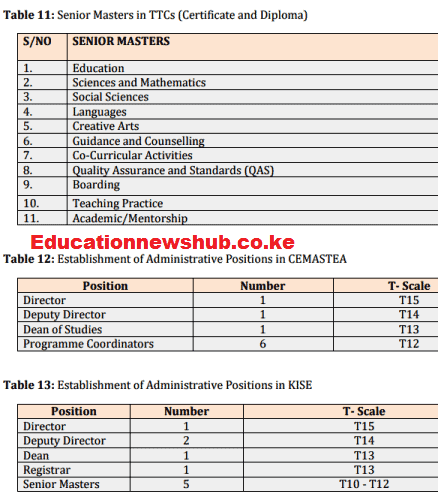

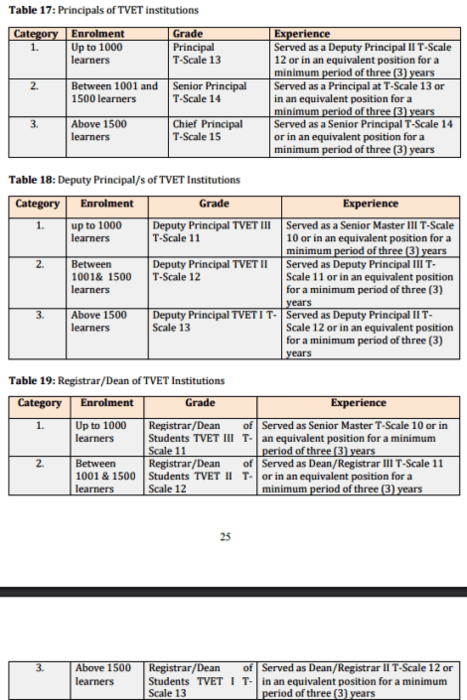
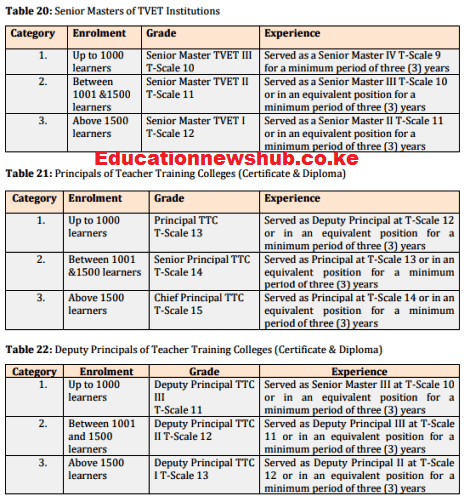
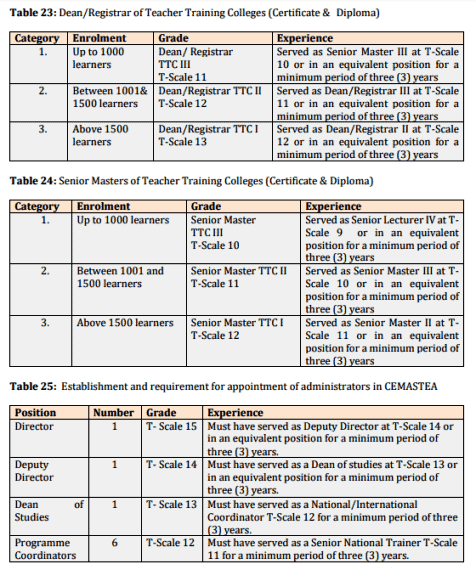
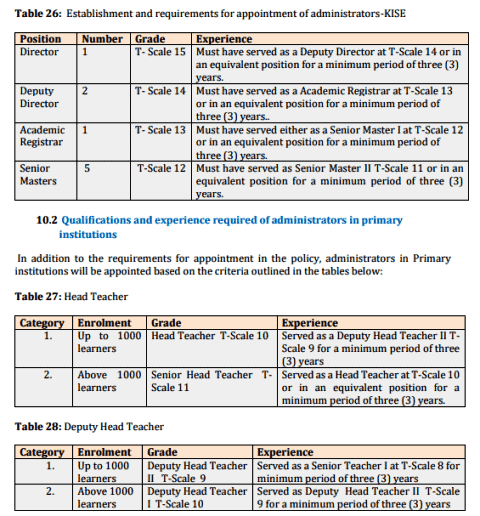

Continue Reading:
- Best TSC Interview Questions and Answers {TSC Official}
- TSC interview questions and their answers- 2024 recruitment
- Latest TSC Interview Questions, Answers and Guiding Notes
- TSC Interview Questions, Notes and Guidelines
- Latest TSC list of Most Common Promotion Interview Questions and Answers (Score above 80%)
- TSC Interview Questions So as to get promotion to next grade
- TSC Interview Questions, Answers & Notes
- Latest TSC Promotions Interview Questions and Answers 2024
- TSC promotion interviews questions and answers; Prepare well
- TSC latest promotion interviews marking scheme and Questions
- Latest TSC Interview areas, questions and new marking scheme/ Score sheet for teachers seeking TSC Promotions; This is all you need to know
- TSC teachers interview promotion questions and their answers- 2024
- Questions asked in TSC promotion interviews & answers
- TSC Promotion Interview in 3 Phases: Interview dates, Venues and Questions
- Latest TSC Promotion Interview Questions, Marking Scheme, Scoring Areas
- TSC promotion interview questions and their answers
- TSC Promotion Interview Areas, Questions And Answers plus Marking Scheme
- TSC promotions interview questions, scoring guide and marks per job group
- TSC promotions interview areas, questions and how to answer
- Latest TSC Promotion interview questions and answers
- Expected TSC promotions interview questions and answers 2024
- New Latest TSC Grading System, TSC Job Groups and Their Salary Scale
- TSC frequently asked questions and answers: TSC News
- Teachers Service Commission, TSC, Kenya – Latest News, Website, Contacts, Portals Complete guide
More reading on TSC matters;
- New, latest TSC Teachers recruitment guidelines
- TSC: Wealth declaration guide for teachers, staff
- A TSC teacher’s payslip details and how to get yours online
- TSC posting, employment, letters for newly recruited teachers
- TSC adds another new teacher registration, employment requirement; read the details
- All TSC online services: the TSC website, online services and how to easily access them
- New list of TSC County Directors
- Updated TSC recruitment guidelines for teachers
- TSC: Process of handing-taking over by new school heads and other administrators
- New academic and professional requirements for registration of teachers
- How to check the status of TSC number application online
- Get the latest TSC news on these official Social Media links (Facebook, Twitter, WhatsApp, Telegram and online)
- How to apply online for the vacant administrative positions at the Teachers Service Commission-tsc
- TSC: Most marketable subject combinations
- TSC: Revised, new, service charter
- TSC: Download all the TSC forms, circulars, regulations and Memos here
- TSC: How to easily get the retirement, pension, benefits
- TSC: Full process of interdicting, disciplining and dismissing teachers
- New, updated, list of offences that can lead to a teacher’s removal from the TSC register
- TSC: All teachers’ leaves explained
- TSC: List of all allowances paid to teachers and to get them
- Latest Career Progression Guidelines, CPG, for teachers
- TSC: Answers to all the Frequently asked questions by teachers
- TSC: A list of all the TSC contacts
- TSC: How a teacher should claim the medical expenses costs from TSC
- TSC: How to best apply for a teacher transfer
- How to easily apply for a TSC number
- Applying for a TSC number? This is all you need to know.
- All what you are required to have in order to apply for a TSC number


